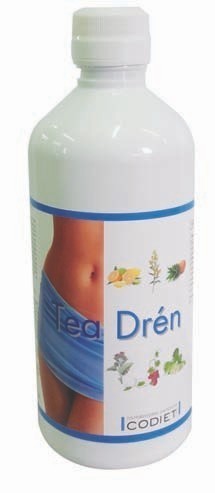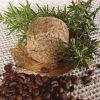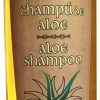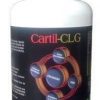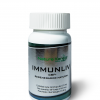PRESENTATION: 500 ml. bottle.
INGREDIENTS: Fructose, Pineapple juice concentrate, Magnesium citrate, Potassium gluconate, Vitamin C, Potassium citrate, Pineapple, Black radish, Burdock, Citrus bioflavonoids, Orthosiphon, Goldenrod, Horsetail, Hamamelis, Red Vine, Sarsaparilla, Ginkgo Biloba, Vitamin B3, B2, B6, B1, Manganese Sulfate, B12, Diluent (Purified Water) and Pineapple Flavor.
TRADITIONAL USE OF ITS COMPONENTS:
BARDANA (Arctium lappa). It is depurative, diuretic, sudorific and stomachic. The root, due to its higher content of inulin, phenolic acids, potassium salts and plant antibiotics, has more cholagogue effect (stimulates bile production), antimicrobial and hypoglycemic (useful for diabetics). The leaves are vulnerary and healing.
It is a very effective depurative to cleanse the blood and lymphatic system. It reduces congestion and swelling, eliminates toxins (either through the skin or urine) and precipitates uric acid. Indicated for rheumatism, arthritis, sciatica, gout, blood acidity, edema, stones (renal and vesicular), acne, eczema, rashes, colds with fever and sore throat, gastric, hepatic and biliary affections, cystitis, urinary infections, nephritis, herpes and diabetes. In the East it is considered a stimulant of the nervous system and sexual invigorating. Recent studies show that it reduces the size of cancerous tumors.
Sarsaparilla (Smilax aspera L.). It is one of the best blood purifiers. It also acts as a diuretic, so it is used in diseases of the kidneys and bladder. It acts as a sudorific and in skin diseases in juvenile acne, eczema, and syphilis.
BLACK RADISH (Raphanus sativus). It contains organic sulfur compounds that favor the drainage of the liver and gallbladder, and because of this, it helps in the elimination of waste and toxins. Its choleretic (stimulating bile secretion) and cholagogue (facilitating the elimination of bile) properties mean that black radish is used to relieve liver and biliary problems (hepatic insufficiency, hepatic colic, migraines of hepatic origin, allergies, digestive problems, etc.).
HAMAMAMELIS ( Hamamelis virginiana ). Witch hazel leaves contain tannins and flavonoids. Thanks to these active principles, this plant is used in the treatment of circulatory disorders.
Witch hazel is one of the most potent astringents. Tannins exert a venotonic action that facilitates the contraction of blood vessels, veins and capillaries favoring blood flow. This makes witch hazel a vasoconstrictor and venous tonic. Used in the treatment of varicose veins, hemorrhoids, phlebitis and diarrhea. As for flavonoids, they exert a vitamin P action that results in an increase in the resistance of small veins and capillaries and a decrease in capillary permeability (outflow of capillary fluid) responsible for edema and inflammation. In addition, witch hazel has important antioxidant properties that protect the walls of veins and capillaries.
It is also used in cases of very abundant periods.
RED VINE (vitis vinifera). Its properties are due to its vasoprotective substances. It combats venous insufficiency and cutaneous capillary fragility (by increasing the resistance of the vessels and decreasing their permeability). The tannins of the red vine favor the contraction of the muscle cells of the blood vessels, facilitating the venous return of the blood accumulated in the legs towards the heart. Therefore, its leaves act as an effective venous tonic for use in: varicose veins, hemorrhoids, phlebitis, edema, capillary fragility, oliguria, diarrhea, dysmenorrhea, metrorrhagia.
It is also antispasmodic, hypnotic and sedative. It is used in anxiety, nervous states and hyperexcitability, neurasthenia, neurosis, insomnia, arrhythmias, tachycardia, nervous disorders of menopause.
In addition, red vine, thanks to the proanthocyanosides in its leaves, has an anti-free radical action and stabilizes the collagen present in the membranes of blood vessels.
GINKO BILOBA. Pharmacological Action: Neuroprotective, peripheral vasodilator, capillary protector (increases resistance and decreases permeability), venotonic, antiplatelet, diuretic.
Indications: Varicose veins, hemorrhoids, chronic cerebral circulatory insufficiency, vascular headaches, vertebrobasilar insufficiency, memory loss, reduced intellectual performance, vertigo and tinnitus of vascular origin, altitude sickness, capillary fragility, phlebitis, thrombophlebitis, arterial hypertension, retinopathies, intermittent claudication, senile dementia, vascular dementia. Prevention of arteriosclerosis and thromboembolisms
ORTHOSIPHON (Ortosiphon stamineus). Also known as java tea, it has been traditionally used to eliminate excess liquid accumulated in the human body. With diuretic effects, orthosiphon also contributes to suppress uric acid, in addition to promoting an antioxidant action due to its ability to expel waste products resulting from the oxidation of free radicals. Rich in Potassium.
GOLDEN WAND (Solidago virga aurea L.). It promotes the formation of urine and dissolves kidney stones, it is used in urinary tract irritations being antiseptic and anti-inflammatory. It eliminates painful urination in cystitis and eliminates sediment, transforming cloudy urine into clear and transparent urine.
HORSE TAIL ( Equisetum arvense L ). The most notable action of "horsetail" is diuretic: due to its richness in potassium salts, flavonoids and saponides, it increases urinary fluid. For this reason, it is indicated to remedy general or localized fluid retention, as well as for other genitourinary problems: kidney stones, urinary infections, cystitis, urethritis, bladder or prostate inflammations.
BIOFLAVONOIDS. Wound healing. They strengthen the walls of blood vessels and are therefore very convenient in case of hemorrhoids, nosebleeds, people who easily get bruises or bruises at the slightest blow, etc.. Bioflavonoids can be a good ally for cardiovascular problems as they regulate coagulation (preventing thrombosis and hemorrhages); preventing cholesterol from oxidizing; strengthening the blood vessels and giving them flexibility, etc. Its use is highly recommended for most circulatory problems (phlebitis, varicose ulcers, varicose veins, arteriosclerosis, etc.). They help to absorb vitamin C. Bioflavonoids also act as antioxidants as they help vitamin C to keep our collagen levels balanced (a substance that gives elasticity to our skin). They eliminate the excess of Copper from our organism. Bioflavonoids help protect us from infections.Symptoms of possible lack of bioflavonoids:One of the most obvious symptoms of bioflavonoid deficiency or that we may be in need of bioflavonoids is a tendency to bleed, hemorrhage and easy bruising of the extremities.
INDICATIONS:
- Fluid retention:
Many people tend to retain fluids without serious causes, but it may be related to conditions in important organs such as the kidney, liver or heart.
If you press your skin with a finger and a mark remains for a while, see a doctor.
Contrary to the image we usually have, veins are not watertight conduits, but their lining allows liquids to enter or leave.
When, for some reason, the mechanism that regulates how much fluid should pass to one side or the other of the veins does not work properly, excess fluid can accumulate in certain parts of the body.
If the water in the body exceeds three-quarters of the body weight (75% of the body weight), there is fluid retention. The reasons for this can be very diverse, such as the veins not having enough consistency to retain the fluid or there being too much blood pressure in the veins. There may also be problems related to the hormones responsible for regulating the mechanism by which the veins become more or less permeable.
When our ankles, legs, abdomen, are more swollen than usual and we do not know the cause, we probably have fluid retention because these accumulate in our body having the feeling of having gained weight when what happens is that we are suffering the product of a metabolic disorder produced by different causes.
This effect occurs when there is an imbalance in our body fluids. Too much fluid is deposited in the blood vessels and body tissues or the fluid that is stored in the tissues is not eliminated through the blood in the normal way. The same occurs when the lymphatic vessels are unable to transport excess fluids with the lymphatic fluids.
of the organism. At this time our body begins to retain fluid.
There can be many causes for this malfunction such as pregnancy, malfunction of the lymphatic glands, kidney, heart or liver failure, obesity, etc. Disorders that cause a malfunction of our body by unbalancing the fluid levels in the body.
Other causes of fluid retention can be external to us, such as standing or sitting for long hours, wearing clothes that are too tight and worsen circulation, excessive heat and humidity, as well as salt abuse in our diet. The same happens with some medications that facilitate fluid retention in our body.
- Hepatic disorders:
Specialists and experts recommend, at least once a year, to purify our body to eliminate all the toxins and wastes that we do not need. The liver plays the role of detoxification of the body, as it converts toxic substances into less harmful and, therefore, feasible to be excreted, mainly if we have been exposed to severe drug or chemotherapy treatments.
The gallbladder works together with the liver and its main function is to concentrate bile, which in turn serves for the digestion of fats.
- How to take care of liver and kidney:
Several experts recommend its purification approximately every six months. But in order to take care of the liver, first of all it is necessary to know which foods are harmful to it. These foods include processed foods, animal fats, sausages, and highly salted, roasted and sugary foods. Also eat in abundance.
To take care of the kidney we must first avoid, for example; excess salt, proteins, foods with acid residues (such as lentils, nuts, coffee, alcohol, plums or blueberries), foods high in purines (sardines, herring, scallops, anchovies, sausages, legumes and offal) and those foods high in potassium (spinach, celery, sweet potato, radicchio, orange, cabbage and potato). can be detrimental to the liver, as very large meals lead to liver overload.
- Circulatory disorders:
Venous insufficiency (when the veins in the legs are unable to adequately pump blood back to the heart). Varicose veins.
- Obstruction of the lymph nodes in the legs:
This is a blockage of the lymph nodes, the vessels that drain fluid from tissues throughout the body and allow immune system cells to travel to where they are needed.
Lymphatic obstruction is also called lymphedema, which means swelling of the lymph ducts. Lymph nodes can become inflamed for any reason. Skin infections such as cellulitis (more common in obese patients)
Symptoms: The main symptom is persistent (chronic) swelling, usually of the arms or legs. Recurrent cellulitis or skin infection can injure the lymphatic vessels and cause infedema of the affected area, which is more commonly seen in obese patients.
We must not forget that it is an anomaly that can be avoided with proper treatment. Normally, if its origin is organic, we must undergo treatment and this will be the one that will dictate the guidelines to follow. If, on the other hand, the retention is due to external causes, we can help ourselves with natural substances and an adaptation of the diet to recover the fluid levels of our body.
INSTRUCTIONS FOR USE: Take one dose (15 ml) before breakfast and lunch.

